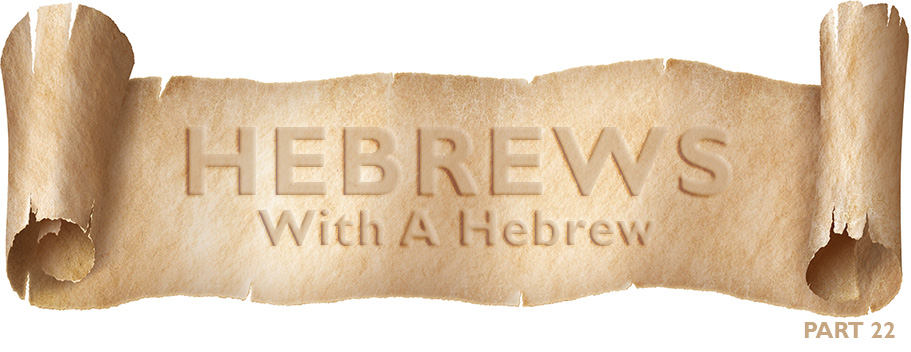Therefore, brothers, since we have confidence to enter the holy places
by the blood of Jesus, by the new and living way that he opened for us
through the curtain, that is, through his flesh, and since we have a great
priest over the house of God, let us draw near with a true heart in full
assurance of faith, with our hearts sprinkled clean from an evil conscience
and our bodies washed with pure water. Let us hold fast the confession
of our hope without wavering, for he who promised is faithful. And let us
consider how to stir up one another to love and good works, not neglecting
to meet together, as is the habit of some, but encouraging one another,
and all the more as you see the Day drawing near.
Hebrews 10:19-25
Based on what he has previously said, the writer now exhorts his readers to “enter the holy places by the blood of Jesus” (10:19). We can do so with confidence (better word than boldness) because God has made it possible through the work of the Messiah. It is not self-confidence based on our service, works, sincerity, etc. We can see that in the little word, therefore, which begins this section. In view of all he has said about Messiah’s blood, we can now come. It is confidence based solely on the fact that God fully accepted Messiah’s blood as an offering.
If we come on that basis, we can be assured that we will be received. There is no possibility of any sin blocking our way since Jesus Himself has born the sin of the whole world. Author Andrew Murray said, “The boldness with which we are told to enter is not, first of all, a conscience feeling of confidence; it is the objective right and liberty of entrance the blood assures us. The measure of our boldness is the measure of the worth God attaches to the blood of Jesus.” In this regard, it is much like the Israelites at Passover; they had to place the blood on their doorposts, trusting that God would accept it. In other words, the blood was for God! This is a new way that Messiah opened to God’s presence. There is no longer any veil separating the believer from God.
Remember, if it is by the blood then we must come, taking our place as the sinners we are. When Messiah died it says the veil separating the holy place from the holiest was rent. It is not so much that God invited us in; rather, in a sense, he was saying, “Let me out of here. “He wanted to bring his people into his presence in a real way, not limited to times and seasons and places. This is possible because He opened the way through the curtain, that is, through his flesh. And that same One through whom his flesh opened the way into his presence is now a great priest over the house of God.
The writer now exhorts us to respond in the form of the repeated phrase, ‘Let us.’ That word is a grace word (not ‘you must’). I call it the ‘let us’ patch. The first thing we are told to do is “draw near with a true heart” (10:22). The word true in the text means “opposite to what is fictitious, counterfeit, imaginary, simulated or pretended.” It means to come with an honest heart, not pretending to be something you are not. The author then says we should “draw near with a true heart in full assurance of faith, with our heart sprinkled clean from an evil conscience.” This whole discussion of the blood deals with the matter of conscience; that marvelous function of the human heart which tells us when we have sinned and done wrong. When we have sinned, we feel guilty and cannot approach God but shrink back.
Today, we are taught to suppress any feelings of guilt. But nevertheless, regardless of our attempts to suppress it, our guilt remains. A good example of that can be found in Psalm 32. David suppressed his guilt and it began to affect his body and mind. It was only when he confessed his sin that his conscience was cleansed.
There is only one thing that can deal with conscience and that is the blood of Jesus. The writer uses the word “sprinkled” in regards to the cleansing of our hearts. This is undoubtedly a reference to both the Passover and the instructions given to Moses that Israel sprinkles the blood of a lamb on the doorposts of their houses, and the sprinkling of the blood of animals on both the people of Israel and the book of the Law (Exodus 24:5-8). This speaks of applying Messiah’s death to our consciences. It is not enough that a lamb has died; its blood must be applied or it is useless. The blood of Jesus is all that we will ever need to cleanse our consciences.
The next ‘let us’ calls upon believers to “hold fast the confession of our hope without wavering” (10:23). The confession of our hope is our belief that Jesus is the Messiah and now, as our high priest, rules over the house of God. The final instance is found in vs. 24-25: “and let us consider how to stir up one another to love and good works, not neglecting to meet together, as is the habit of some, but encouraging one another, and all the more as you see the Day drawing near.” The writer sends an important word about “not neglecting to meet together as is the habit of some.” Rather than shrinking back from meeting together, the author calls for believers to do it all the more.





0 Comments